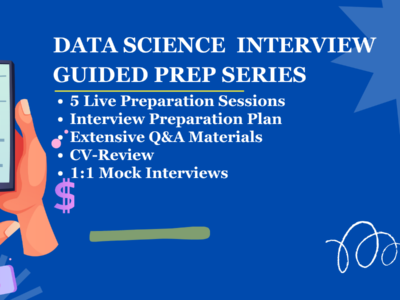Machine Learning Mastery using Python
Total Curriculum Duration – 20 Hours
In this course, you will learn the basics of Python Language, a total of five Machine Learning Techniques such as Linear Regression, Logistic Regression, Support Vector Machines, Decision Tree…..
Course Introduction
This course spans 2 weeks, 10 LIVE online sessions of 2 hours each, totaling 20 hours.
In this course, you will learn the basics of Python Language, a total of five Machine Learning Techniques such as Linear Regression, Logistic Regression, Support Vector Machines, Decision Tree and Random Forest for solving a variety of problem types. There will also be five projects that will be demonstrated and five projects given as assignments to consolidate your learning.
Teksands High Impact Series is designed specifically for the busy professionals who would want to develop the maximum understanding on the topics in the shortest time possible. This course uses a completely practical based approach to run through as much as projects/code/demo as possible and explain both the concepts and coding/solutions parts on the go with the demo. The learners are then given additional projects as practice assignments for them to solve them on their own and solidify their understanding.

Courses Features
- 10 x 2 Hours LIVE Instructor-led Sessions
- 7 Modules
- All Sessions Recorded Videos available
- 5 Projects
- Quizzes & Assessment
- Instructor Support through learners forum
- Additional Resources
- Certificate
Detailed Description Of the Courses
This LIVE course, Machine Learning Mastery will provide 20 hours of intense LIVE Training to the Learners.
- Basics of Python Language: Helps learners to understand the Language Elements of Python and data structures including Pandas and Numpy Libraries. This will enable you to code Machine Learning solutions covered in subsequent chapters.
- Linear Regression Algorithm: Techniques walking through a real-world project to solve a prediction problem.
- Logistic Regression Algorithm: To understand the foundations of Classification techniques.
- Support Vector Machines: To solve complex classification problems.
- Decision Tree and Random Forest Algorithms: Learn these very efficient tree-based techniques for complex classification challenges.
- Understand how to choose the right algorithms: For various types of Machine Learning problems.
What will you learn?

Real Life Projects


Upcoming Batches
| Start Date | Schedule | Timings | Book Now |
|---|---|---|---|
| 18th Oct | Mon-Fri (10 weekdays) | 7 – 9 am | Request Brochure/ Register for Demo Class |
| 15th Nov | Mon-Fri (10 weekdays) | 7 – 9 am | Request Brochure/ Register for Demo Class |
FAQs
1. What are the Professions/Job Roles in Data Science & Analytics space?
Data Science and Predictive Analytics has served a multitude of functions and job needs and a lot of Job Roles are created in organizations in the last few years. Some of the prominent Job Roles in this space are listed below:
Data Scientist: Data Scientists would have the responsibility of understanding and analysing all the data the organisation has and create Data Driven products and solutions to create businesses processes more efficient, drive automation, create decision systems, future prediction systems, etc.
Data Architect: Data Architects would typically analyse the organisational Data Schemas, design new schemas for newer data driven systems , tune existing data schemas, optimise organisational Mete Data and all data repositories including ETL Systems.
Data and Analytics Manager: Responsible for managing and leading Data initiatives in the organisation, including leadership in ETL programs, Decision Systems programs, leading analytics teams, etc.
Data Analyst: Data Analysts typically gather and analyse data within divisions and organisation for the purpose of building Insights and Analytics solutions and systems using a range of tools, techniques including statistics. This role is highly important for the leadership of any organisation to develop understanding of business trends.
Machine Learning Engineer: Responsible for developing sophisticated Machine Learning Models that are to create various Decision, Prediction, Classification, Clustering systems on Business Data. All the roles above and the plethora of roles this space is offering are growing rapidly in demand and skills shortfall is even expanding leading to high salaries for every skilled personnel in these fields.
Given “Data is the new Fuel”, demand for professionals in these fields in the many years to come will continue to expand unabated creating massive opportunities for data professionals.
2. What is the skill demand in this field?
With Data Science applications booming through businesses leading to saving costs, better profitability and driving newer business models and products, the demand for these skills have skyrocketed. Literally, every business today is after quality skilled professionals in Data Science and Analytics. Not only they are looking for Data Science and Predictive Analytics skills to create new solutions, but preferring these as must-have skills in all other fields to drive continuous automation and efficiency. Even Business and Operations personnel are today are equipping themselves with foundational knowledge in these areas to save costs through automation.
Some statistics:
- 70-80% Year on Year New Job Numbers Growth in Data Science and related skills
- 15-20% Year on Year Average Salary Growth in these fields
- 85% of the Companies are Investing and expanding their Data Science Teams rapidly
- In 2020-21, there is a net shortage of 250,000+ skilled resources in these fields
- 2 Years is approximate Data Science Staff Tenure in companies
3. What is the approach of Teaching?
The course is completely based on practical approaches of teaching. Learners will have intense exposure to real code and data while learning the concepts on the go. We will also provide you all the codes used in training and also additional problems for you to work on and practice.
The Delivery method is Online, Live Classes led by Professional, Industry Experienced Instructors.
4. What is the course duration?
20 Hours
Weekday Courses: Over 2 Weeks, all Weekdays (Monday to Friday), 2 hour Sessions per day.
Weekend Courses: Over 3 Weekends, Saturdays and Sundays, 3.5 hour Sessions per day.
(Please check your specific course schedule)
5. Is there any software Requirements for this course?
- Laptop with Windows 7, 8, 10 / MacOS / Linux
- Internet Connectivity
- Latest Chrome / Firefox Browser
- Microsoft Excel
- Python Version 3 or above (https://www.python.org/downloads/)
- Anaconda Platform (https://www.anaconda.com/distribution/)
6. Who are the instructors for this course?
All courses on Code4x are taught by Industry Professionals, highly qualified and focused Research Scholars from Reputed University.
Curriculum
Curriculum
- 7 Sections
- 28 Lessons
- 20 Hours
- Introduction To Python3
- Introduction to Machine Learning4
- Linear Regression with Demo and Assignment5
- Logistic Regression with Demo and Assignment5
- Support Vector Machines with Demo and Assignment5
- Decision Trees and Random Forest with Assignment5
- Model Selection Methods1





